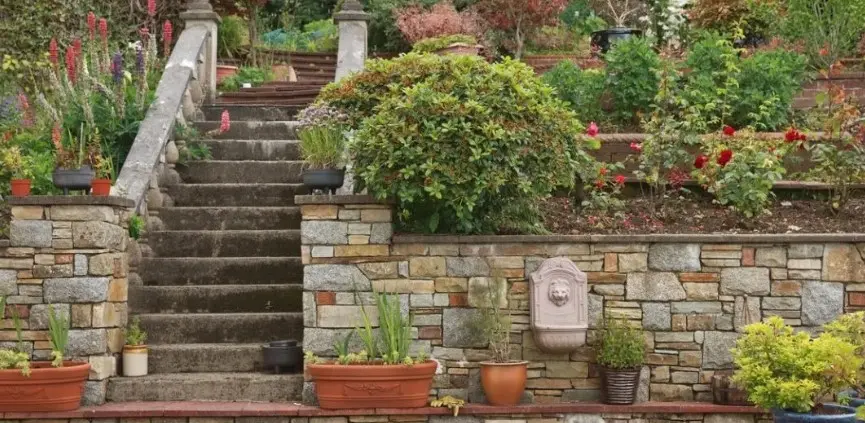Retaining walls are no longer just a functional necessity for sloped or eroding yards—they’ve become an essential design feature in outdoor spaces across Texas. In Colleyville and surrounding areas, retaining walls help manage elevation changes, protect landscapes from water damage, and create space where none existed before. But more than that, when done right, they add beauty, curb appeal, and structure to a yard.
Let’s dive into the different types of creative retaining wall designs, why they work, and how they can transform your yard into something both practical and stunning.
Why Retaining Walls Matter
In areas like Colleyville, the soil composition, mostly clay-heavy, tends to expand and contract with moisture levels. That movement puts pressure on landscapes, driveways, and even foundations. Retaining walls help combat these forces by keeping soil in place and preventing erosion.
They’re also ideal for:
- Managing steep slopes
- Creating flat spaces for gardens or patios
- Controlling water runoff
- Increasing usable yard space
According to the USDA’s Natural Resources Conservation Service, retaining walls are one of the most effective tools for erosion control in residential settings.
1. Tiered Garden Walls
Instead of one large wall, tiered retaining walls break elevation into multiple levels. This not only reduces pressure on each wall but also opens up opportunities for planting beds between layers. You can add color with seasonal flowers or texture with ornamental grasses. Lighting can be added to the steps or edges to enhance nighttime appeal.
Design Tip: Use complementary colors or contrasting textures for each tier to create visual interest.
2. Natural Stone Walls
Natural stone gives your yard a rustic, timeless feel. Whether it’s chopped limestone, sandstone, or fieldstone, the unique shapes and shades of each piece make the wall feel like an organic part of your landscape. These walls work well in traditional or luxury settings and are especially effective when integrated into native plant designs.
Function Meets Beauty: Natural stone allows drainage through the small gaps between stones, reducing pressure from water buildup.
3. Boulder Retaining Walls
For a bold, earthy look, boulder walls make a big impact. They’re sturdy, ideal for large slopes, and offer a natural barrier without the need for mortar. In places like Texas, where stone is readily available, this design also supports sustainable sourcing.
Best Use Case: Larger properties with dramatic elevation changes or rustic outdoor themes.
4. Gabion Walls
Gabion walls use wire cages filled with rocks, river stones, or even recycled concrete. Originally used in civil engineering, they’ve become a trendy design feature in modern landscapes. Their industrial feel pairs well with minimalist outdoor furniture, xeriscaping, or even fire pits.
Bonus: Gabion walls are permeable, making them ideal for areas that need drainage control without sacrificing aesthetics.
5. Retaining Walls with Built-In Seating
If you want to make the most of your outdoor space, retaining walls can do double duty. Adding flat-topped walls at sitting height around a patio or fire pit creates a place to rest and entertain—without cluttering your yard with extra furniture.
This design is popular for families, entertainers, and small yards that need every feature to work hard.
6. Wooden or Timber Walls
Wooden retaining walls offer a warm, casual vibe and blend easily with natural landscapes. While not as long-lasting as stone or concrete, they are cost-effective and quicker to install. Pressure-treated lumber or rot-resistant wood like cedar is key to long-term durability.
Pro Tip: Incorporate planters or trellises into the design for vertical gardening options.
7. Living Retaining Walls
Living walls—or “green walls”—combine structural support with vertical gardens. These walls use modular blocks or geogrid systems that allow planting directly into the wall itself. They’re not only beautiful but improve air quality, reduce heat, and provide a habitat for beneficial insects.
This style fits especially well in eco-conscious designs or smaller urban yards.
8. Concrete Block Retaining Walls
Modular concrete blocks offer clean lines and a modern look. Available in a variety of colors and textures, they’re engineered for strength and built to interlock. You’ll often see these around suburban homes where functionality meets a polished aesthetic.
They also allow for design flexibility: curves, corners, steps, and tiers can all be incorporated without complicated masonry work.
How to Choose the Right Design for Your Yard
Here are a few considerations before deciding:
- Slope & Soil Type: Steeper slopes or unstable soil may require more robust engineering and materials.
- Drainage Needs: Poor drainage can lead to failure, so walls must include proper weep holes or gravel backfill.
- Style of Your Home: Match the materials and layout to your home’s architecture and existing landscaping.
- Maintenance Level: Stone and concrete require less upkeep than timber or green walls.
It’s also wise to check local building codes. In many cities, any retaining wall over 4 feet tall requires a permit and professional design.
The Long-Term Value of Thoughtful Design
Retaining walls are more than just barriers. They shape how your yard functions, looks, and feels. A well-designed retaining wall can increase the usable square footage of your yard and even boost property value.
According to the National Association of Realtors’ 2023 Remodeling Impact Report, landscape upgrades—especially those with functional hardscaping—return more than 80% of their cost at resale.
Also read-First Home Buyer’s Playbook: Smart Tips to Win Your Dream Home


